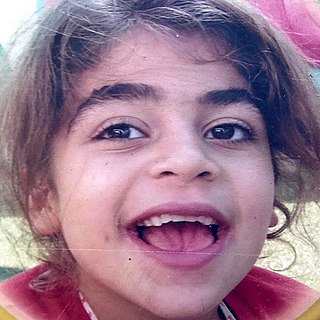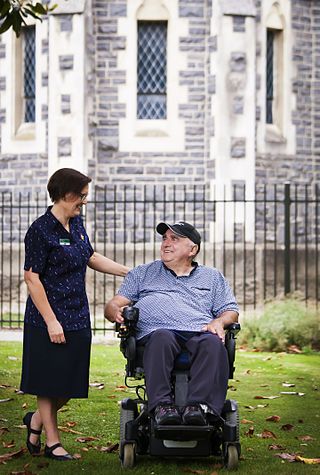In a support group, members provide each other with various types of help, usually nonprofessional and nonmaterial, for a particular shared, usually burdensome, characteristic. Members with the same issues can come together for sharing coping strategies, to feel more empowered and for a sense of community. The help may take the form of providing and evaluating relevant information, relating personal experiences, listening to and accepting others' experiences, providing sympathetic understanding and establishing social networks. A support group may also work to inform the public or engage in advocacy.
A virtual community is a social network of individuals who connect through specific social media, potentially crossing geographical and political boundaries in order to pursue mutual interests or goals. Some of the most pervasive virtual communities are online communities operating under social networking services.
A rare disease is a disease that affects a small percentage of the population. In some parts of the world, an orphan disease is a rare disease whose rarity means there is a lack of a market large enough to gain support and resources for discovering treatments for it, except by the government granting economically advantageous conditions to creating and selling such treatments. Orphan drugs are ones so created or sold.
An online community, also called an internet community or web community, is a community whose members interact with each other primarily via the Internet. Members of the community usually share common interests. For many, online communities may feel like home, consisting of a "family of invisible friends". Additionally, these "friends" can be connected through gaming communities and gaming companies. Those who wish to be a part of an online community usually have to become a member via a specific site and thereby gain access to specific content or links.
Palliative care is an interdisciplinary medical caregiving approach aimed at optimizing quality of life and mitigating suffering among people with serious, complex, and often terminal illnesses. Within the published literature, many definitions of palliative care exist. The World Health Organization (WHO) describes palliative care as "an approach that improves the quality of life of patients and their families facing the problems associated with life-threatening illness, through the prevention and relief of suffering by means of early identification and impeccable assessment and treatment of pain and other problems, physical, psychosocial, and spiritual". In the past, palliative care was a disease specific approach, but today the WHO takes a broader patient-centered approach that suggests that the principles of palliative care should be applied as early as possible to any chronic and ultimately fatal illness. This shift was important because if a disease-oriented approach is followed, the needs and preferences of the patient are not fully met and aspects of care, such as pain, quality of life, and social support, as well as spiritual and emotional needs, fail to be addressed. Rather, a patient-centered model prioritizes relief of suffering and tailors care to increase the quality of life for terminally ill patients.
Cancer support groups are meetings that offer a safe space for people affected by cancer to share their experiences and emotions with other people who have cancer. People in stressful situations benefit from having a good social support system, and a cancer support group can be part of a support system.

Sanfilippo syndrome, also known as mucopolysaccharidosis type III (MPS III), is a rare autosomal recessive lysosomal storage disease that primarily affects the brain and spinal cord. It is caused by a buildup of large sugar molecules called glycosaminoglycans (AKA GAGs, or mucopolysaccharides) in the body's lysosomes.
CaringBridge Inc. is a charitable 501(c)(3) non-profit organization established in 1997 which allows people facing various medical conditions and their family and friends to communicate. CaringBridge is the first and most widely used global communication platform for supporting health journeys of any kind. It is dedicated to helping family and friends communicate and support caregivers, as well as the loved ones they are caring for, during a health journey. This is achieved through the use of free and ad-free personal CaringBridge pages. CaringBridge prioritizes privacy with no advertisements or selling of user data. People who are provided with an individual's personal website address (URL) and password can read updates on the individual's condition or post messages to the family as needed. CaringBridge is headquartered in Eagan, Minnesota. All CaringBridge sites are free and CaringBridge is funded by donor support.
Online health communities are online social networks related to health. They primarily provide a means for patients and their families to learn about illnesses, to seek and offer social support, and to connect with others in similar circumstances. These online groups can be composed of individuals with illnesses, groups of medical professionals with shared interests, non-professional caregivers and family of patients, or a combination. The term "online health community" is primarily academic jargon.

A caregiver, carer or support worker is a paid or unpaid member of a person's social network who helps them with activities of daily living. Since they have no specific professional training, they are often described as informal caregivers. Caregivers most commonly assist with impairments related to old age, disability, a disease, or a mental disorder.

XXXchurch.com is a website developed by Live Free Ministries dedicated to helping men with pornography and sex addiction by promoting a Christian ideology of healthy sexuality and mental well-being. The website was launched in 2002 and relaunched/rebranded in 2021 when it became part of Live Free Ministries, a New Jersey based 501c3 nonprofit.
As populations age, caring for people with dementia has become more common. Elderly caregiving may consist of formal care and informal care. Formal care involves the services of community and medical partners, while informal care involves the support of family, friends, and local communities. In most mild-to-medium cases of dementia, the caregiver is a spouse or an adult child. Over the period of time, more professional care in the form of nursing and other supportive care may be required medically, whether at home or in a long-term care facility. There are evidences to show that case management can improve care for individuals with dementia and the experience of their caregivers. Furthermore, case management may reduce overall cost and institutional care in the medium term. Millions of people living in the United States take care of a friend or family member with Alzheimer’s disease or a related dementia.

Rare Disease Day is an observance held on the last day of February to raise awareness for rare diseases and improve access to treatment and medical representation for individuals with rare diseases and their families. The European Organisation for Rare Diseases established the day in 2008 to raise awareness for unknown or overlooked illnesses. According to that organization, treatment for many rare diseases is insufficient, as are the social networks to support individuals with rare diseases and their families; furthermore, while there were already numerous days dedicated to individuals with specific diseases, there had previously not been a day for representing those affected by rare diseases. In 2009, Rare Disease Day went global as the National Organization for Rare Disorders mobilized 200 rare disease patient advocacy organizations in the United States while organizations in China, Australia, Taiwan, and Latin America also lead efforts in their respective countries to coordinate activities and promote the day.

EURORDIS-Rare Diseases Europe (EURORDIS) is a non-governmental patient-driven alliance of patient organisations and individuals active in the field of rare diseases that promotes research on rare diseases and commercial development of orphan drugs. EURORDIS is dedicated to improving the quality of life of all people living with rare diseases in Europe. It was founded in 1997; it is supported by its members and by the French Muscular Dystrophy Association (AFM), the European Commission, corporate foundations and the health industry.
The Rare Diseases Clinical Research Network (RDCRN) Contact Registry is a patient contact registry sponsored by the National Institutes of Health (NIH). The RDCRN Contact Registry collects and stores the contact information of people who want to participate in RDCRN-sponsored research or learn more about RDCRN research. It connects patients with researchers in order to advance rare diseases research.

The Alzheimer's Foundation of America (AFA) is an American nonprofit organization based in New York City whose mission is to provide support, services and education to individuals, families and caregivers affected by Alzheimer's disease and related dementias nationwide, and fund research for better treatment and a cure. AFA unites more than 2,000 member organizations from coast-to-coast that are dedicated to meeting the educational, social, emotional and practical needs of individuals with Alzheimer's disease and related illnesses, and their caregivers and families. Member organizations include grassroots Alzheimer's agencies, senior centers, adult daycare center, home healthcare agencies, long-term care residences, research facilities, and other dementia-related groups. AFA holds Charity Navigator's highest rating of 4 stars.
Ben's Friends is an American non-profit organization that operates free, online patient support communities for people with rare diseases. It was founded in 2007 by Ben Munoz and Scott Orn and was granted 501(c)(3) nonprofit status on February 9, 2014. It is headquartered in Austin, Texas.

Inspire is an Arlington, Virginia-based healthcare social network. It builds and manages online health communities for patients and caregivers, and connects patients to life science companies for the purpose of research.

Van Den Berghe Dequeker syndrome, also known as ulnar hypoplasia-split foot syndrome is a very rare congenital limb malformation syndrome which is characterized by severe ulnar hypoplasia, absence of the index to pinky finger in both hands, and split-foot.








